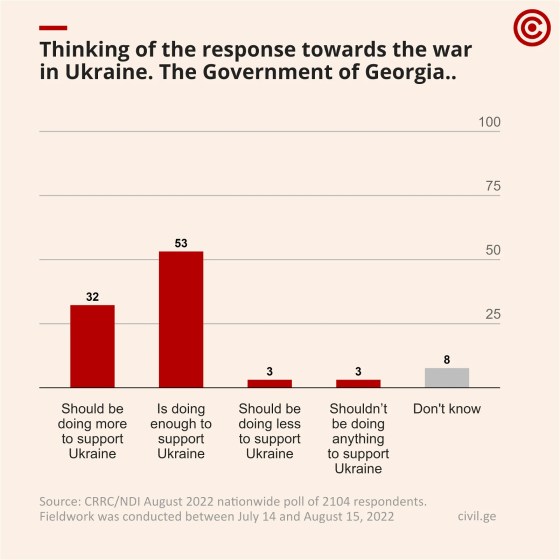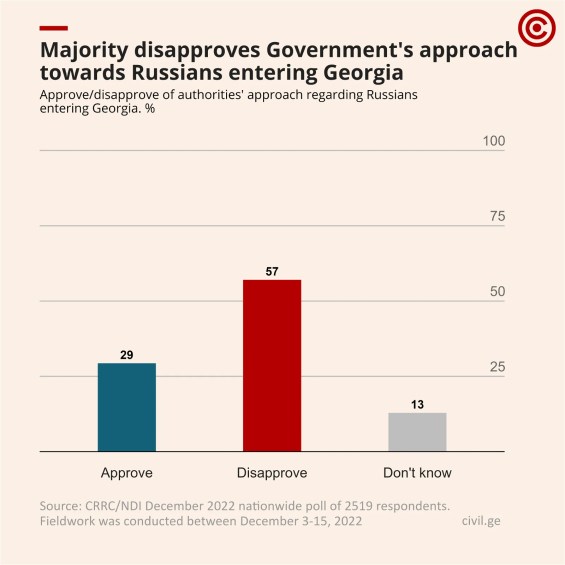Policy Brief: Relations Between Ukraine and Georgia at a Historic Low
The policy brief “Current Challenges of Georgia-Ukraine Relations: Strategic Allies in a Spiral of Antagonism” authored by Volodymyr Posviatenko, a scholar at the Jagiellonian University in Krakow and the University of Padova, examines the complexities within the relationship between Georgia and Ukraine – the two nations once considered close strategic partners – and concludes that relations are at an all-time low.
Complex Dynamics in GD Ukraine Relations
According to the policy brief, relations between Georgia and Ukraine have deteriorated significantly since Russia’s full-scale invasion of Ukraine. The Georgian Dream (GD) government’s ambiguous stance on Russian aggression has increased discord and escalated tensions, damaging the strategic partnership.
Research highlights: “The GD government’s ambiguous position can be explained by its belief that, given Georgia’s position outside NATO’s security umbrella, appeasement of Russia is the best way to guarantee Georgia’s security. For Ukraine, however, Georgia’s behaviour undermines the strategic partnership between the states”.
The brief states that “there have been numerous disagreements between the two governments, revealing differences in ideology, values, foreign and security policy orientation, as well as a lack of mutual solidarity.”
In spite of the strained relationships between the two governments, the people of both Georgia and Ukraine share strong positive opinions about each other. This is evidenced by Georgians’ overwhelming support for Ukraine during the full-scale Russian invasion, with an impressive majority of 88% supporting Ukraine, while whopping 98% have very favorable (90%) or favorable (8%) overall opinion of the people of Ukraine. Both countries have a history of mutual assistance – Ukrainian volunteers joined Georgia during the war in Abkhazia, and Georgian volunteers have been actively involved in Ukraine since 2014, forming the largest group of foreign fighters. “A Ukrainian victory could mean an opportunity for Georgia to restore its territorial integrity and bring justice against the Russian aggressor”- notes the report.
The GD government’s “non-irritation” stance with Russia, opting for a restrained and conciliatory approach that emphasized economic issues over confrontational rhetoric, raised suspicion in Ukraine, despite Georgia’s continuous support for Ukraine on international platforms. Furthermore, the conspiracy theory, often repeated by senior GD figures, claims that the UNM, the Ukrainian government, and unnamed Western leaders – the alleged “global party of war” – are collectively attempting to drag Georgia into the war as a so-called “second front” against Russia.
The opinion of the Georgian society on their government’s policy towards Ukraine is split, with over a third of the population believing it should be doing more to support Ukraine.

Georgia’s growing economic ties with Russia are a major point of concern for Ukraine, as stressed in the research: “From Ukraine’s perspective, any state engaged in economic activity with Russia risks boosting Russia’s ability to evade sanctions and sustain its military efforts… A particularly alarming example in this regard is Georgia’s decision to renew direct flights with Russia, including by companies sanctioned by Ukraine for operating flights to temporarily occupied Crimea”.
Also, the Georgian society is generally critical of their government’s treatment of the incoming Russian citizens, with 57% of the population disapproving of the Georgian government’s approach and 69% support the introduction of the visa regime for Russian citizen.

“Saakashvili Factor”
In the 2000s, Georgia and Ukraine experienced a period of close relations under Presidents Saakashvili and Yushchenko. They forged a strategic partnership driven by shared goals of European and Euro-Atlantic integration. Georgia’s successful anti-corruption reforms inspired Ukraine’s democratic movement, fostering strong bonds between the UNM and Ukraine’s pro-Western political parties.
From the Georgian Dream (GD) government’s perspective, the involvement of UNM, especially Saakashvili, in Ukrainian politics was a major point of contention in their bilateral relations. The GD government was particularly irritated by Ukraine granting Saakashvili citizenship and appointing him as the governor of Odesa Oblast. Meanwhile, the Ukrainian government argued that this issue should not affect their overall bilateral relations. Thus “Saakashvili factor” emerged as a significant disruptive element in Georgia-Ukraine relations.
The Association Trio Dynamics Altered
The Russian invasion of Ukraine led to significant changes in the dynamics of the Association Trio (A3), consisting of Ukraine, Georgia, and Moldova. As a response to the invasion, Ukraine formally applied for EU membership, followed by Moldova and Georgia. In 2022, the EU granted candidate status to Ukraine and Moldova, while Georgia, which due to concerns about Georgia’s democratic backsliding, had its European perspective legally confirmed but fell short of getting the candidate’s status.
The division of the A3 into candidate states Ukraine and Moldova and non-candidate Georgia, coupled with disagreements between the Georgian and Ukrainian governments, has weakened the unity
between the A3 states in their European integration.
Prime Minister Gharibashvili’s comments, asserting that Georgia deserved EU candidate status more than Ukraine and Moldova and suggesting that not receiving it was a “punishment for not being at war”, were seen as insensitive and obstructive to Ukraine-Georgia reconciliation. This was particularly problematic as Ukraine’s resistance to Russian aggression had led the EU to adopt a more positive stance on potential EU membership for all A3 countries, including Georgia.
Conclusions and Recommendations
The policy brief emphasizes the importance of prioritizing friendly relations between Ukrainian and Georgian societies, highlighting that discord only benefits Russia. Both countries should work towards resolving tensions, taking into account shared values and the ongoing geopolitical significance of their strategic partnership. To achieve normalization, the research suggests considering several recommendations:
For the Georgian government:
- To unambiguously display solidarity with Ukraine;
- To improve clarity in communication concerning the issues of sanctions and military aid;
- To hold meaningful discussions about measures available for Georgia to assist Ukraine;
- To examine options for diversifying Georgia’s trade connections and reducing economic reliance on Russia;
- To demonstrate a willingness to revitalize the Associated Trio format and utilize it to enhance cooperation and achieve closer economic and political integration;
- To boost participation in multilateral initiatives with Ukraine and other strategically important countries, including the Three Seas Initiative and consider creating new cooperation frameworks in the Black Sea region, as well as with the Ukraine-Poland-Baltic axis.
For the Ukrainian government:
- To consider reappointing an ambassador to Georgia.
- To issue statements only through authorized channels, considering potential threats to
Georgia’s security and the sensitivity of Georgia’s internal and regional political
environment; - To reconsider its approach towards military aid from Georgia, refraining from making
such requests, given Georgia’s lack of NATO’s security umbrella; - To de-personalize bilateral relations, concentrating on institutionalized international
cooperation; - To clearly state unwavering support for Georgia’s EU and NATO accession;
- To promote and encourage cooperation between Ukrainian and Georgian civil societies.
This article has been archived for your research. The original version from Civil Georgia can be found here.


